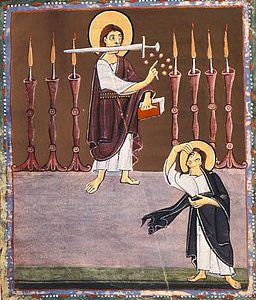Overview of the Laodicea Letter In terms of overall tone and themes, the Laodicea letter is similar to the Sardis letter, but it is even more negative. Jesus does not mention any strengths for the church, nor does he mention…
Teaching the Seven Letters of Revelation, Part 6d: Jesus’ Promise to the Conquerors in the Philadelphia Letter, Including a “New Name”

The Philadelphia letter already contains several promises of Christ to this faithful church. It closes with his promises to the conquerors. Jesus says, “The one who conquers, I will make him a pillar in the temple of my God and…
Teaching the Seven Letters of Revelation, Part 6c: Jesus’ Promise to Keep the Philadelphia Church from the “Hour of Testing”

The obedience of the church at Philadelphia comes up at the beginning of Revelation 3:10. It says, “Because you have kept my command to persevere, I also will keep you from the hour of testing that is going to come…
Teaching the Seven Letters of Revelation, Part 6b: The Philadelphia Church and an Ironic Fulfillment of Isaiah 60:14

In Revelation 3:9, Jesus promises that a time will come when the Jews who are persecuting them will bow at their feet. He says, “Behold, I will cause those from the synagogue of Satan, who are calling themselves Jews and…
Teaching the Seven Letters of Revelation, Part 6a: The Philadelphia Letter and the Key of David

Overview of the Philadelphia Letter The Philadelphia letter provides a marked contrast to the noticeable trajectory of decline that one observes in the progression from Pergamum to Thyatira to Sardis. Her letter corresponds to the letter to Smyrna in terms…
Teaching the Seven Letters of Revelation, Part 5c (Sardis Letter): What Does Jesus Mean by the Promise Not to Erase a Person’s Name from the Book of Life?

The promise of white garments is also the first element of Jesus’ promise to the conquerors. Revelation 3:5 says, “The one who conquers will thus clothe himself in white garments and I will certainly not erase his name from the…
Teaching the Seven Letters of Revelation, Part 5b: Those at Sardis Who Have Not Defiled Their Garments

What Does Jesus Mean by “Defiled Their Garments”? In Revelation 3:4, Jesus commends those who are exceptions to his criticism of the Sardis church. He says, “But you have a few names in Sardis who have not defiled their garments,…
Teaching the Seven Letters of Revelation, Part 5a: The Sardis Letter and the Coming of Jesus

Overview of the Sardis Letter The Pergamum and Thyatira churches are struggling to maintain their doctrinal purity in the midst of stumbling blocks from false teachers and the prophetess Jezebel. In spite of the damaging effects of false teaching, Christ…
Teaching the Seven Letters of Revelation, Part 4c: The Reward for the Conquerors in the Thyatira Letter

Teaching the Seven Letters of Revelation, Part 4c: The Reward for the Conquerors in the Thyatira Letter Those who have rejected Jezebel’s teaching deserve no other “burden” (2:24). However, Jesus does exhort them to persevere until his coming and places…
Teaching the Seven Letters of Revelation, Part 4b: Who Is Jezebel and What Is She Teaching?

What Is Jezebel’s Sexual Immorality or Harlotry? In Revelation 2:20, Jesus highlights the glaring weakness of the church at Thyatira. Revelation 2:20 says, “But I have against you that you are tolerating the woman Jezebel, who calls herself a prophetess,…